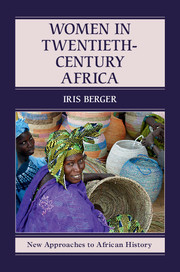Book contents
- Frontmatter
- Dedication
- Contents
- LIST OF ILLUSTRATIONS
- LIST OF MAPS
- PREFACE
- Map
- Introduction
- 1 Colonizing African families
- 2 Confrontation and adaptation
- 3 Domesticity and modernization
- 4 Mothers of nationalism
- 5 The struggle continues
- 6 “Messengers of a new design”: marriage, family, and sexuality
- 7 Women's rights: the second decolonization?
- 8 Empowerment and inequality in a new global age
- Contradictions and challenges
- REFERENCES AND FURTHER READING
- INDEX
Introduction
Published online by Cambridge University Press: 05 May 2016
- Frontmatter
- Dedication
- Contents
- LIST OF ILLUSTRATIONS
- LIST OF MAPS
- PREFACE
- Map
- Introduction
- 1 Colonizing African families
- 2 Confrontation and adaptation
- 3 Domesticity and modernization
- 4 Mothers of nationalism
- 5 The struggle continues
- 6 “Messengers of a new design”: marriage, family, and sexuality
- 7 Women's rights: the second decolonization?
- 8 Empowerment and inequality in a new global age
- Contradictions and challenges
- REFERENCES AND FURTHER READING
- INDEX
Summary
During the first decades of the twenty-first century, popular media portrayed Africa as a dangerous, disorderly continent that was particularly threatening for women. Reflecting such sentiments, Helene Cooper, a Liberian-born journalist for the New York Times, called Africa “the worst place there is to be a woman.” Writing of the city of Bukavu in the Democratic Republic of Congo, Cooper described “an old woman, in her 30s” walking up a hill away from town:
She carried so many logs that her chest almost seemed to touch the ground, so stooped was her back. Still, she trudged on, up the hill toward her home. Her husband was walking just in front of her. He carried nothing. Nothing in his hand, nothing on his shoulder, nothing on his back. He kept looking back at her, telling her to hurry up.
Yet Cooper's article communicated not despair, but hope for the women who, in her words, “somehow manage to carry that entire continent on their backs.” They were the women who in the Liberian election of 2005 ignored the threats from young men to resume war if their candidate were defeated and flocked to the polls to elect a Harvard-educated banker, Ellen Johnson Sirleaf, as president. With this election, Johnson Sirleaf, imprisoned under an earlier regime, became the first woman to be elected head of an African country. These events in another country led Cooper to conclude, “I want to go back to Bukavu to find that woman, and to tell her what happened in Liberia. I want to tell her this. Your time will come too.”
Despite the distressing conditions that Cooper depicted, the narrative of oppression oversimplifies the lives of African women by neglecting class, power, and regional and cultural differences among them. In both precolonial and current African societies, women's position was complex, depending on their age and marital status, the economic possibilities open to them, and whether they lived in matrilineal communities where kinship was determined through women or patrilineal societies where it was traced through men.
- Type
- Chapter
- Information
- Women in Twentieth-Century Africa , pp. 1 - 5Publisher: Cambridge University PressPrint publication year: 2016



